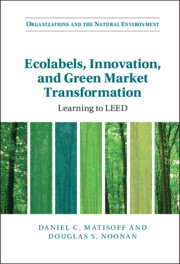Book contents
- Ecolabels, Innovation, and Green Market Transformation
- Organizations and the Natural Environment
- Ecolabels, Innovation, and Green Market Transformation
- Copyright page
- Dedication
- Contents
- Figures
- Tables
- Preface
- 1 Advancing a Perspective of Green Market Transformation
- 2 The Architecture of Green Building Policies and Practice
- 3 Choose Your Own Adventure!
- 4 The Labeling Building Challenge
- 5 The Public and Private Benefits of Green Building
- 6 Tossing a Pebble in a Pond
- 7 Demonstrating Innovation in Green Buildings
- 8 Keep Raising the Bar
- 9 It’s Not Easy Being Green
- 10 A Blueprint for Green Market Transformation
- 11 Conclusions
- Index
- References
11 - Conclusions
What Are We Building To?
Published online by Cambridge University Press: 27 October 2022
- Ecolabels, Innovation, and Green Market Transformation
- Organizations and the Natural Environment
- Ecolabels, Innovation, and Green Market Transformation
- Copyright page
- Dedication
- Contents
- Figures
- Tables
- Preface
- 1 Advancing a Perspective of Green Market Transformation
- 2 The Architecture of Green Building Policies and Practice
- 3 Choose Your Own Adventure!
- 4 The Labeling Building Challenge
- 5 The Public and Private Benefits of Green Building
- 6 Tossing a Pebble in a Pond
- 7 Demonstrating Innovation in Green Buildings
- 8 Keep Raising the Bar
- 9 It’s Not Easy Being Green
- 10 A Blueprint for Green Market Transformation
- 11 Conclusions
- Index
- References
Summary
This chapter takes stock of Green Market Transformation in the built environment and explores the potential to replicate this model. It notes that market-based solutions, while canonical in policy spheres, have failed to solve the climate problem. Instead, by drawing upon Elinor Ostrom’s work, opportunities for institutions and polycentric solutions as well as to leverage voluntary actions are observed. Rather than frame the problem of markets versus regulation, the limits of both are recognized and a way to harmonize them sought. When ecological crises require massive solutions, we look to harness the power of market forces rather than sideline one of our most effective institutions. A vital role is seen for policy to guide and foster markets to find and implement solutions. The scale of the problems facing us demands a grassroots, bottom-up approach that enlists the efforts of households, workers, and firms around the planet. The challenge for policy-makers is in facilitating that and in devising and supporting mechanisms so that voluntary action also serves the greater public benefit.
Keywords
- Type
- Chapter
- Information
- Ecolabels, Innovation, and Green Market TransformationLearning to LEED, pp. 278 - 300Publisher: Cambridge University PressPrint publication year: 2022

